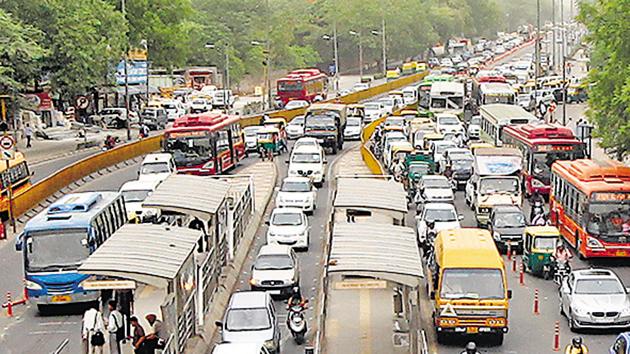Sharing road space, vehicles, data could end congestion in our cities
As we respond to vehicular congestion by building road infrastructure, excluding key factors, such as data and kind of vehicles, from design plans could leave cities under a mound of cars.
Congestion has become a major challenge in countries around the world, including India. A lot of it is because of increase in the ownership of private motor vehicles and their usage. Cities have responded to this challenge, mostly by building extensive road infrastructure. However, even with so much effort, our urban centres are unable to build their way out of vehicular congestion.

The World Energy Outlook (WEO) report by the International Energy Agency forecast that worldwide, the passenger car ownership is expected to grow from less than 20 vehicles per 1,000 inhabitants today to 175 cars per 1,000 people by 2040. This means that in about 21 years from now, the overall road passenger vehicle activity will increase by more than six-times.
A lot of this growth and usage of will come from Asian, followed by the African countries. But these counties will not be able to address the future avalanches because of their population. This growth will not only result in a huge area being consumed by roads and parking, but will also have a huge impact on road safety, air pollution and inclusive mobility, due to their inefficient use.
Therefore, to address this issue, cities need to better utilize the transportation assets. Here are three ways in which it can be done.
Infrastructure Asset
We all know that roads are the biggest transport infrastructure in cities. However, they are not efficiently used by city planners. For example, as per international studies, a 3.5metre-wide lane of road can carry 9,500 pedestrians per hour per direction, and the number come down to 7,000 if these people use cycles. If the same people use buses instead, the number becomes 4,500. The same study suggests that for cars, the road’s carrying capacity would be reduced to 1,000 per hour per direction.
Therefore, its logical to assume the city administration would earmark space on streets depending on the mode and number of people needed to be transported. But in reality, our project planners keep on earmarking spaces for cars.
It is clear that cities are wasting a huge amount of road infrastructure by not putting it to the right use. Cities need to share the streets with other modes of transport by earmarking space and design for all these functions.
Vehicular Assets
Mobile assets, in our cities, are the vehicles that ply on roads. Our streets are full of different kinds of vehicles ranging from bicycles, cycle rickshaws, two-wheelers, three-wheelers, buses and cars. Yet, the focus is always towards moving cars faster, even at a cost of other vehicles.
Studies show that a private car in our cities sits idle 95% of the time in parking lots. This is a huge waste of precious urban space, apart from a huge economic loss. Therefore, cities need to focus on incentivizing deployment of assets that have higher usage i.e. public transport and para transit.
For private vehicles, the ownership needs to be discouraged and instead sharing should be promoted. For example, commercial car sharing is illegal in India, but it is not a rocket science to understand that a car with three passengers is much better than that with a single user.
Therefore, shared vehicles and shares rides should be the mantra.
Information Assets
Information, or data to be precise, is the new oil. Yet, our cities are not realising the importance of data-based planning. Both private and public sector collect transport data, but this data is neither collated nor shared. The result is that on the one side public agencies pay consultants multiple times to collect the same data and on the other side, lack of quality data impacts planning.
Ride sharing companies such as Uber and Ola, or mobile companies have a huge amount a good quality data that can be used for effective planning. However, this data is not shared due to business reasons.
Therefore, it is important for cities to collect, collate and share the transportation data or any other data related to the planning of cities. This can now be done on a real-times basis by operationalising an open data policy.
The sharing economy is one of the strongest driving forces of this century. The reason why it works is that it allows maximum utilisation of assets. One example of sharing that is visible in the transportation sector is the ride-sharing space. The tremendous growth of peer-to-peer ride sharing has resulted in services such as Uber, Ola etc becoming nearly ubiquitous in the day-to-day lives of people.
However, the real impact will only become visible when all the three assets—infrastructure, vehicles and information—are utilised in an effective manner. One way to do it would be through sharing because we all know that sharing is caring.
@amitbhatt4u
(Amit Bhatt is the director of integrated transport, WRI India)
Stay updated with all the Breaking News and Latest News from Mumbai. Click here for comprehensive coverage of top Cities including Bengaluru, Delhi, Hyderabad, and more across India along with Stay informed on the latest happenings in World News.
Stay updated with all the Breaking News and Latest News from Mumbai. Click here for comprehensive coverage of top Cities including Bengaluru, Delhi, Hyderabad, and more across India along with Stay informed on the latest happenings in World News.






